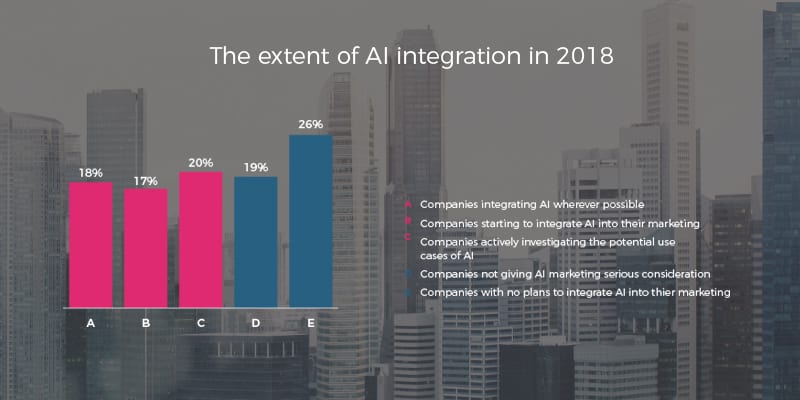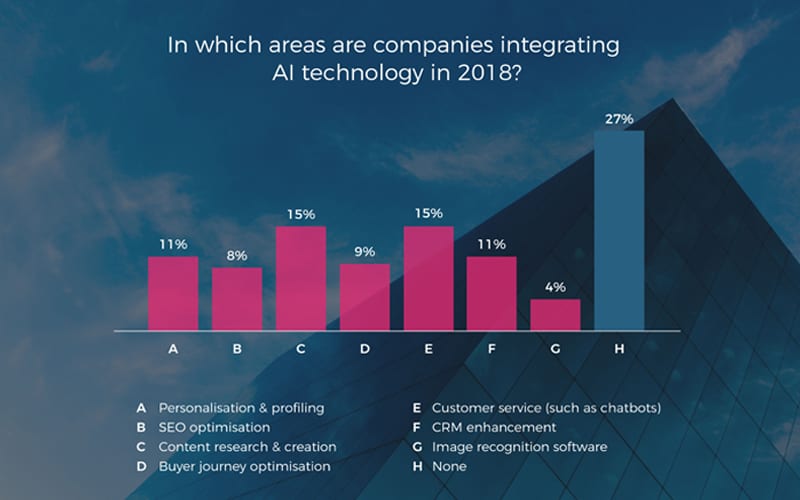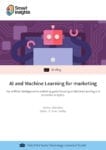Managing the changes brought about by AI applications is the next big challenge for marketers
Artificial intelligence applications are already becoming a mainstay within marketing teams across the globe. With pickup levels of AI marketing initiatives already much higher than you might think.
From interviews with 100 senior marketers from a wide range of industries, we found that 55% of companies are either currently implementing or actively investigating some form of AI initiative within their marketing practices. Meaning, AI is already shaking things up in the industry.
Unsurprisingly, this inevitable rise of AI technologies in marketing is causing a major shift in the way companies work. With more and more companies looking to adopt a data-centric approach to meet the demand for more effective digital marketing.
Nonetheless, there remains to be a clear consensus on the extent of the changes that AI will bring to marketing. Leaving many companies and marketers in the dark about the benefits of AI integration, and the potential gap opening up between those who are adopting AI wherever possible and those who are entirely late to the game.
To understand the extent of the changes in the industry, we set out to uncover exactly how AI is impacting marketing in 2018, and what marketers must do in order to coexist with technologies that are changing the fundamental dynamics of their profession.
Download our Premium Resource – SucAI and Machine Learning for Marketing
The guide aims to help businesses of all sizes to apply to their marketing, focusing on Artificial Intelligence. All businesses can now use the services we recommend to implement Machine Learning. The guide explains why, how with an actionable and practical approach.
Access the AI and Machine Learning for marketing briefing
The impact of AI on marketing
When we talk about AI in marketing, we’re mostly concerned with AI applications that are able to process and interpret big data in ways humans cannot. While relatively new, these applications are already having a major effect on marketing practices and company cultures.
For many senior figures within the industry, it is AI’s capacity to hyper-personalize marketing communications that shows the most potential for advancement in a world that is becoming oversaturated with information.
In conversation with Thomas Power - board member at 9Spokes and a major influencer in AI and emerging technology - suggested that:
“messages have to be so carefully chosen, and so carefully timed, that it can’t be done by a human. Only a machine is capable of that.”
Going on to claim that because of this changing demand the role of the human marketer will be extinct as soon as 2025. While this may be somewhat hyperbolic, it is nonetheless indicative of the rate of change that the industry is currently experiencing.
With this being said, hyper-personalization within marketing is something we are already seeing, and it isn’t leaving marketers out of work. Marketing automation tools such as HubSpot and HootSuite allow for personalized communications on mass. However, they’re serving the marketer as a way of making potentially dull tasks simpler. Not replacing them outright.
Unlike this type of service - aimed at improving the ways marketers are able to function day to day - AI applications are/will be capable of things human marketers cannot possibly do. Begging the question, are marketers completely replaceable?

Will AI take marketing jobs?
35% of the 100 marketing leaders we interviewed during our research think that AI will have completely replaced current marketing practices by 2025. However most believe that the changes we’ll see won’t replace marketers outright, they will simply demand that marketers adapt to work alongside and in support of these powerful AI applications. With the consensus being that whatever the extent of the changes brought about by AI, it will never be actionable without skilled humans marketers working in tandem.
Interestingly, our research highlighted an almost even split between those companies that are actively integrating (or looking to integrate) AI into their marketing (55%), and those that are either unaware of AI’s growing influence or simply choosing to ignore it (45%).

As the technology advances, it’ll be interesting to see how these different schools of marketing shape up in competition, with AI-centric models going head-to-head with more traditional set-ups.
As far as big data is concerned, it seems self-evident that AI-based models will come out on top in a world where data-centric marketing is consistently delivering better and better results for businesses of all kinds. As this ascendency becomes more ingrained, marketing jobs will gradually become more supportive roles, with marketers working with AI and big data applications to get the most out of them.
Crucially, this responsibility shouldn’t be downplayed. Without non-bias human input, guidance and management, and without skilled marketing strategists and creatives on hand to put insights to good use, big data is too abstract and AI too easily led astray to function as an effective marketing tool.
A key takeaway from this is that while it may be a challenge to adapt to the demands of AI in marketing, there will be huge scope for marketers to develop new skills to rise to this challenge.
The potential gains for those businesses who are able to find the perfect balance between marketer and machine will be huge.
In which areas are companies integrating AI?
Most companies investing in AI are primarily doing so to stay competitive in an increasingly data-oriented marketing landscape.
Through our interviews, we found that the personalization of marketing communications and data analysis were the dominant areas for AI marketing, with 29% and 22% of interviewees (respectively) stating these as the areas where they saw most potential for improvement at the hands of AI.
Data harbors endless potential with digital insights on audience. Unlocking this potential is rocket fuel for the trajectory of any business. But doing so is clearly difficult.
We set out to identify the areas where money was actually being spent on AI applications to achieve this.
The key areas of AI investment/integration:
- Personalization & profiling (11%)
- SEO (8%)
- Content research & creation (15%)
- Buyer journey optimization (9%)
- Customer service / Chatbots (15%)
- CRM enhancement (11%)
- Image recognition software (4)
- None (27%)

Again, a large proportion of businesses aren’t investing in AI at all. And across those that are, there is no area that is an out-and-out frontrunner.
As all of these applications of AI in marketing are still in their adolescence, companies seem to be trying them out as they look to get the upper hand. With no clear formula for success to guide them.
Moving forward, companies need to think about the areas of their specific business that could benefit most from AI advancements, without forgetting the human aspects necessary to deliver them effectively.
How can marketers successfully coexist with AI?
As AI develops, coexisting with AI applications (in some form) is inevitable for most marketers in most industries. And learning how to use AI in a way that will actually deliver growth for your business will be the central challenge for businesses and marketing teams across the globe.
From our interviews, certain skills came out as the most desirable from a hiring perspective, as companies begin to look for marketers with broader skill sets.
The following areas came out on top:
- Critical thinking/ problem solving (32%)
- Creative skills (26%)
- Coding/programming (26%)
- Pattern identification/strategy (16%)
As marketing changes, the future of the industry will start to be defined by this relationship between human and data-crunching machine. As AI will clearly dominate in certain areas, we wanted to find out where humans can outperform the bots, suggesting further areas for marketers to develop their skills.
Where humans outperform AI:
- Creative thinking (70%)
- Strategic planning (42%)
- Client services (36%)
- Content creation (34%)
- Data interpretation (31%)
- Community building (27%)
AI is not going to change marketing overnight. It’s been a part of marketing for some time already and many of you may not have noticed its effect.
Nonetheless, the advancements AI has brought to the industry are substantial and they will only continue. As a data-centric approach becomes the expected approach, choosing to ignore the changes may leave you further behind than you want to be.
For more details, you can find the full research report - which breaks down the findings from interviews with 100 senior marketers on the emerging role of AI in the industry - here.
Thanks to Daniel Cooke for sharing his thoughts and opinions in this post. Daniel is a scriptwriter, copywriter and creative at London-based digital marketing agency
Big Rock, where he researches the practical implications of emerging technologies to assist growing businesses. You can follow him on
Twitter or connect with him on
LinkedIn.











